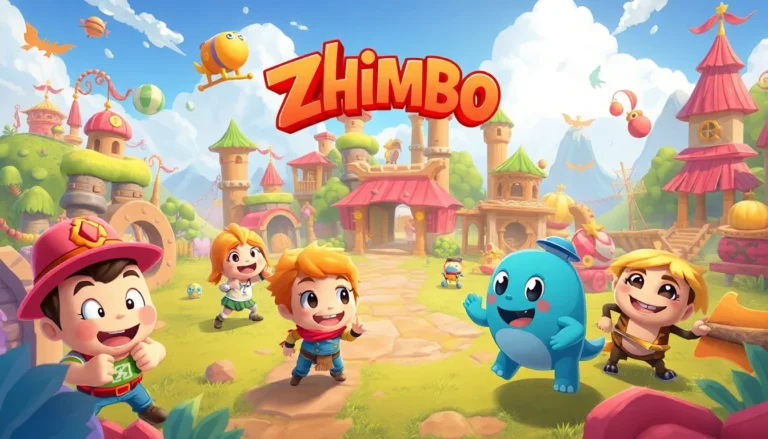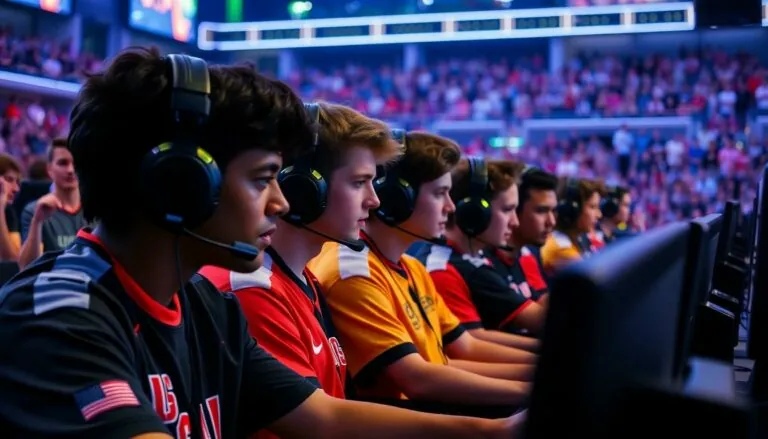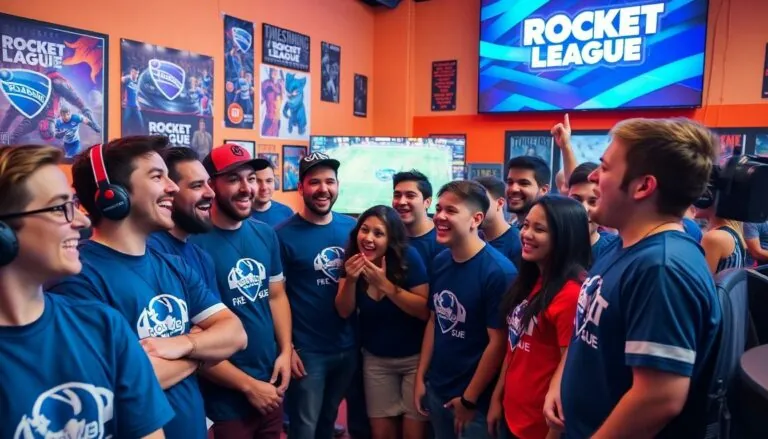Imagine a world where your gaming skills translate into real-life glory and prizes, all while you sit in your pajamas. Welcome to the wild realm of fantasy esports! Here, fans become managers, crafting dream teams from their favorite players, all while indulging in a bit of friendly competition. It’s like playing chess but with a lot more pixels and a lot less sitting still.
Fantasy esports is taking the gaming community by storm, blending the thrill of traditional fantasy sports with the adrenaline of competitive gaming. Whether you’re a seasoned pro or just dipping your toes into the gaming pool, there’s something for everyone. So grab your controller, assemble your squad, and get ready to dive into a universe where strategy meets fun. Who knew being a virtual coach could be this exhilarating?
Table of Contents
ToggleWhat Are Fantasy Esports?
Fantasy esports represents a modern evolution in the realm of competitive gaming. Players create imaginary teams using real athletes from various esports tournaments. Each player’s performance directly impacts the fantasy team’s score, establishing a dynamic and engaging competition among participants.
In this format, participants use strategy to choose athletes based on statistics and past performances. Engaging with fantasy esports allows individuals to apply their gaming knowledge in real time while enjoying camaraderie with friends and fellow gamers. Gamers often research players, monitor performance metrics, and adapt their strategies based on changes in the esports landscape.
Platforms hosting fantasy esports offer diverse games like League of Legends, Dota 2, and Counter-Strike: Global Offensive. Various tournaments provide multiple opportunities for fantasy team creation, resulting in ongoing excitement throughout the season. Engaging formats often include daily, weekly, or entire season-based contests, allowing participants to find options that fit their preferences.
Participants benefit from numerous strategies to enhance their chances of success. Analyzing player statistics, understanding team dynamics, and considering match schedules all contribute to effective decision-making. Additionally, platforms provide various tools and resources, which help users gain insights into their selected players’ performances.
This innovative approach to traditional fantasy sports fosters community and friendly rivalry, making it an ideal choice for gamers looking to elevate their experience. As more enthusiasts join the fantasy esports landscape, the interplay between gaming skill and competition continues to thrive.
Popular Fantasy Esports Games
Fantasy esports games blend strategic gaming with real-world competition. Players enjoy creating teams from actual esports athletes, enhancing their gaming experience through analysis and competition.
Overview of Leading Titles
League of Legends ranks as one of the premier titles in fantasy esports. Dota 2 also holds significant popularity, allowing users to build dream teams from top players. Counter-Strike: Global Offensive attracts a dedicated fan base, with many participating in fantasy leagues. Other notable games include Fortnite, Rocket League, and Overwatch, all featuring unique elements that resonate with gamers. Each game offers specific fantasy mechanics that encourage engagement and strategic thinking.
Key Features and Mechanics
Fantasy esports platforms provide tools for team assembly, allowing users to select players based on performance metrics. Participants receive points based on athletes’ actual gameplay, linking virtual success to real-world events. Leagues often feature daily, weekly, or season-long match formats, appealing to various play styles. Additionally, analytics tools enable gamers to assess player performance trends, creating data-driven strategies. Community forums and leaderboards enhance the competitive atmosphere, promoting interaction among participants.
Benefits of Participating in Fantasy Esports
Fantasy esports offer numerous benefits, including skill enhancement and community connections. Participants enjoy an immersive experience that not only entertains but also educates.
Strategic Thinking and Skill Development
Participants in fantasy esports engage in strategic thinking and skill development. Analysis of player statistics and performance patterns enhances decision-making. Moreover, participants develop research skills by evaluating athletes across different tournaments. Players create competitive lineups, testing their knowledge and intuition. This continuous evaluation and adaptation lead to improved strategic planning. Additional layers of strategy appear as participants engage in trade opportunities and player drafting. Strengthening skills in this environment promotes overall gaming competence.
Community Engagement and Social Interaction
Fantasy esports foster community engagement and social interaction among participants. Competitive leagues and platforms allow players to connect with friends and other enthusiasts. Joining forums and discussion groups enhances shared experiences. Participants often engage in lively debates about game tactics and player performance. These interactions create a sense of belonging within the esports community. Social features, such as leaderboards, promote friendly rivalry. Participants celebrate achievements together, enriching the overall gaming culture.
Challenges and Risks in Fantasy Esports
Fantasy esports carries significant challenges and risks that participants should consider.
Financial Implications
Many participants invest real money in entry fees or purchases for fantasy platforms. High stakes can lead to substantial losses, especially for newcomers unfamiliar with the competitive landscape. Industry reports indicate that players spend an average of $100 annually on fantasy entries. Some participants face overspending, driven by the desire to succeed. Players should assess their budgets and set limits to avoid financial strain. Understanding potential payouts and risks associated with investing ensures a more strategic approach.
Time Commitment and Addiction
Engagement in fantasy esports demands considerable time and attention. Participants often spend hours researching players and analyzing statistics to make informed decisions. Studies show that excessive involvement can lead to addictive behaviors, impacting daily life and personal relationships. Many players devote significant periods to managing teams, making it easy to overlook other responsibilities. Setting boundaries for gameplay time fosters a healthier balance between fantasy esports and everyday life. Acknowledging the risk of addiction helps inform responsible participation.
Future of Fantasy Esports
The evolution of fantasy esports continues to gain momentum, with technology shaping experiences for participants. Rapid advancements in data analytics improve gameplay, providing users with deeper insights into player performance. Several platforms are incorporating augmented reality features, enhancing engagement and interactivity.
Emerging trends indicate a rise in mobile applications, allowing players to manage their fantasy teams anytime and anywhere. Increased accessibility is likely to attract a broader audience, from seasoned gamers to casual fans. Engagement through social media integration supports community building, fostering real-time discussions and interactions among players.
Various competitions will expand, accommodating different skill levels and preferences. Casual players can participate in short contests, while professional-level tournaments offer more serious gameplay with higher stakes. Esports organizations are investing in marketing strategies designed to promote fantasy esports further, indicating a growth trajectory in popular culture.
Sustainability remains a focal point. Advocacy for responsible gaming practices promotes healthy participation by encouraging players to set budgets and limits. Additionally, educational resources on strategic planning and gameplay will enhance player experience, equipping participants with valuable knowledge to improve their gaming skills.
Global expansion presents new opportunities as esports tournaments reach audiences worldwide. Cultural differences can permeate gameplay styles, adding variety and excitement to fantasy leagues. As fantasy esports continues to merge with mainstream sports, its influence and popularity are bound to increase across diverse demographics.
Conclusion
Fantasy esports is redefining how gamers engage with competitive gaming. By merging strategy with real-world performance, it offers an exhilarating experience that attracts players of all skill levels. The community aspect enhances the enjoyment, allowing participants to connect with friends and like-minded enthusiasts.
As technology continues to evolve, fantasy esports will likely become even more accessible and engaging. The growing interest in responsible gaming practices ensures that players can enjoy the thrill without compromising their well-being. With its promising future, fantasy esports is set to capture the hearts of gamers worldwide, creating exciting opportunities for competition and camaraderie.







